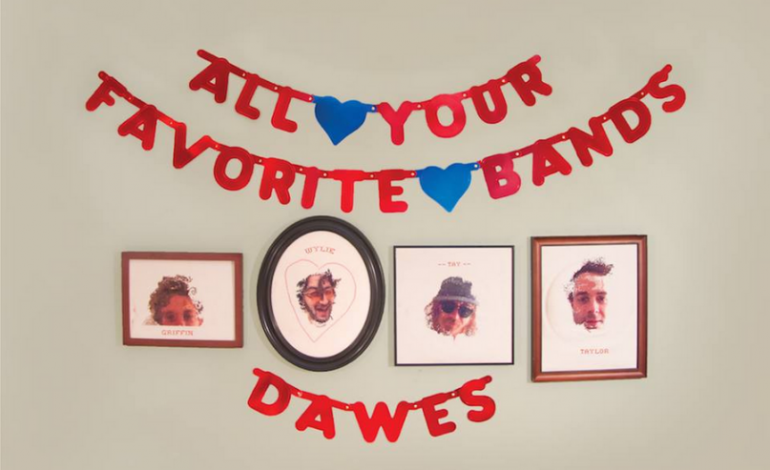

[Not] Your Favorite Band
Another indie folk rock group, Dawes, comprises a quartet of Los Angeles-based dudes delivering their fourth studio album, All Your Favorite Bands. If generic male vocals, one-level only instrumentals, unimaginative melodies, and little emotion describes “all your favorite bands,” then congratulations! You’ve found the correct album. Otherwise, have your real favorite bands on standby.
All Your Favorite Bands has a certain naturalness to the instrumentation. Most tracks feature straight ahead drums, guitar, vocals, and sometimes piano/keyboard. Oh, and there’s a bass player, Wylie Gelber, but good luck picking that out of the mix. It’s a fairly simple setup, but often in the way that sounds like the band emerged only half-baked from the garage stage of their career. Or maybe drummer Griffin Goldsmith should consider tightening (and tuning) all of his kit’s drum heads, the snare especially, or play patterns that stray away from the downbeats more often.
Taylor Goldsmith’s vocals are pretty generic with quite a bit of dispassion. The lyrics “Can’t help how I feel / I don’t think anyone can” in opener, “Things Happen,” do not inspire the belief Goldsmith feels anything. They are delivered completely with a flatline melody and a backing band which doesn’t increase or decrease intensity for anything. A slightly different vocal timbre on tracks such as “Somewhere Along the Line” yields only a sound akin to singing with the mouth half-closed. Occasionally when Goldsmith stretches into his upper register, like on the chorus of ballad “Waiting on Your Call,” the melody opens up for a glorious moment, but the moment passes too soon.
Short surprises are sprinkled throughout the album. A female vocal interjection on “I Can’t Think About it Now” is a breath of fresh air. Tay Strathairn’s rich piano opening with rolls into phrases on title-track, “All Your Favorite Bands,” coupled with a more emotional and dynamic vocal line and luscious guitar support is a more compelling track. “To Be Completely Honest” has a pseudo ‘60s groove intro which builds into a flushed out chorus, a format which supports Goldsmith’s narrow vocal melodies well, with plenty of room for guitar solos.
Naming an album All Your Favorite Bands seems risky, or maybe in this case it was a warning. Though it’s not all bad, and those who are into this male-dominated indie phenomenon with a whole lot of bands doing the same thing, might be satisfied, this record just doesn’t have enough going for it. It’s not emotionally compelling, not musically impressive and lacks nuance all around. Probably not Dawes’ intention, but All Your Favorite Bands begs listeners to turn this off and listen to their actual favorite bands instead.
